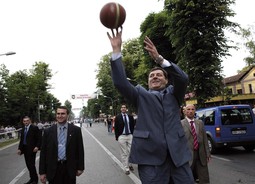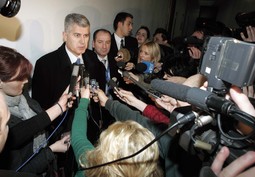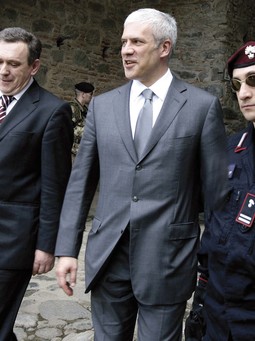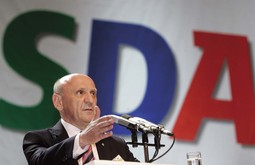Published in Nacional number 721, 2009-09-08
A NEW COALITION for a Bosnian turnaround
HDZ Bosnia & Herzegovina and Dodik join forces to divvy up Bosnia
THE BELGRADE MEETINGS between Serbian President Boris Tadic, Milorad Dodik and HDZ BiH president Dragan Covic in late August has demonstrated a new partnership and portends the creation of a third entity
 A meeting between Serbian President Boris Tadic, Republika Srpska Prime Minister Milorad Dodik and HDZ Bosnia & Herzegovina president Dragan Covic in Belgrade on 28 August 2009 could mark a watershed in the political landscape and future of Bosnia & Herzegovina. In spite of this fact the Croatian media had no commentary of the meeting. This was the first time that a representative of the leading Croatian political party in Bosnia & Herzegovina, in agreement with Milorad Dodik and without the presence of an SDA leader, met with a Serbian president. Admittedly, Sulejman Tihic also recently met with Boris Tadic and Montenegrin President Filip Vujanovic, but he was not in the company of Milorad Dodik, and these meetings were on the margins of international venues, which is a crucial difference.
A meeting between Serbian President Boris Tadic, Republika Srpska Prime Minister Milorad Dodik and HDZ Bosnia & Herzegovina president Dragan Covic in Belgrade on 28 August 2009 could mark a watershed in the political landscape and future of Bosnia & Herzegovina. In spite of this fact the Croatian media had no commentary of the meeting. This was the first time that a representative of the leading Croatian political party in Bosnia & Herzegovina, in agreement with Milorad Dodik and without the presence of an SDA leader, met with a Serbian president. Admittedly, Sulejman Tihic also recently met with Boris Tadic and Montenegrin President Filip Vujanovic, but he was not in the company of Milorad Dodik, and these meetings were on the margins of international venues, which is a crucial difference.
Covic has thereby in fact confirmed that there is an impasse in the relations with the Bosniac leadership on the issues of constitutional reform and territorial restructuring and that Milorad Dodik has become the key partner to Croatians in Bosnia & Herzegovina. One could conclude that Dragan Covic did in fact, with the visit to Belgrade, herald the introduction of a third entity, which Dodik advocates, and he, among other things, confirmed this in his commentary to Nacional's query on the reasons behind the visit to Serbian President Boris Tadic with Republika Srpska leader Milorad Dodik.
"We need constitutional reform urgently because without it there is no progress in Bosnia & Herzegovina. With the existing constitutional framework we cannot make the vitally needed step forward that would open the door of the European Union to us. When it comes to constitutional reform, HDZ BiH does not want any kind of cosmetic change, and we underline that the starting point for talks is what was agreed upon in the Prud Agreement. For HDZ BiH the current two-entity division of Bosnia & Herzegovina is not acceptable, because it does not secure a promising European future for Bosnia & Herzegovina, or equal rights for the Croatian nation with the other two constitutive peoples," said HDZ BiH president Dragan Covic, responding to Nacional.
Covic was unambiguous in stating that the existing two-entity division of Bosnia & Herzegovina is unacceptable for the HDZ, which is quite the opposite of the positions of the Bosniac political leadership, and plays into the hands of Dodik's long time aspirations that the Croatians also get their own entity. There is no doubt that Dodik is not doing so out of love for the Croatians in Bosnia & Herzegovina, and that his only interest is to solidify the Republika Srpska as a country within a country with the final aim of seeing as little as possible power shifted to the central institutions of Bosnia & Herzegovina in the constitutional reform.
The meeting in Belgrade has provoked numerous reactions from politicians in Bosnia & Herzegovina, with particularly negative commentary coming from the SDA. According to Amir Zukic, the SDA general secretary, it is evident that there is an attempt to reaffirm the scenario of political instability present in the 1990s. In recent statements Zukic has emphasised that the talks that Tadic led with Dodik and Covic, and without Sulejman Tihic, as the SDA president, certainly do not contribute to Serbia's progress towards the European Union. The president of the Social Democratic Union of Bosnia & Herzegovina (SDU BiH), Nermin Pecanac, feels that the official visit of high-ranking officials from Bosnia & Herzegovina, Milorad Dodik and Dragan Covic, and their meeting with Serbian President Boris Tadic is an "open provocation to the state institutions of Bosnia & Herzegovina, because there was no official representative of the state institutions of Bosnia & Herzegovina, or a representative of the Bosniac people."
 Some are going so far as to equate this kind of meeting with the Tudjman-Milosevic meetings in Karadordevo. Furthermore, the meeting in Belgrade took place at a very sensitive political juncture, when the Croatian ministers in the Government of the Federation of Bosnia & Herzegovina, Vjekoslav Bevanda, Feliks Vidovic, Nevenko Herceg and Damir Ljubic, in late August decided to boycott its work. The reason they did so was their disagreement with changes to the route of the motorway on corridor 5C in Herzegovina.
Some are going so far as to equate this kind of meeting with the Tudjman-Milosevic meetings in Karadordevo. Furthermore, the meeting in Belgrade took place at a very sensitive political juncture, when the Croatian ministers in the Government of the Federation of Bosnia & Herzegovina, Vjekoslav Bevanda, Feliks Vidovic, Nevenko Herceg and Damir Ljubic, in late August decided to boycott its work. The reason they did so was their disagreement with changes to the route of the motorway on corridor 5C in Herzegovina.
HDZ BiH president Dragan Covic also commented the reactions from Bosnia politicians. "HDZ BiH sincerely advocates the development of a modern and decentralised Bosnia & Herzegovina in which all three nations would have an equal status. These changes have to be carried out through Parliament and by a consensus of all three sides. On this road we are unquestionably dedicated to developing Bosnia & Herzegovina and its European future. I am unhappy that I have been placed in the context of some deals that would be against the interest of Bosniacs. There is no one who could accuse me of behaving like a nationalist or radical. If anyone is tolerant, than it is I. I never have and never would undertake the division of Bosnia & Herzegovina in Belgrade. There is no one in Bosnia & Herzegovina that loves this country more than I do, and I see no one working more in Bosnia's favour. I do not want a halved Bosnia & Herzegovina, but rather a modern country. There are no conspiracy theories. I have never been, nor will I ever be part of some pact against the Bosniacs," Covic emphasised.
"I can repeat before a hundred thousand Bosniacs everything I said in Belgrade. Because there is no bad or malevolent intent in it. I am the last person who would consider doing something underhand. I am deeply hurt by the fact that there are comparisons between my meeting in Belgrade with the meetings in Karadordevo!? But even prior to my departure for Belgrade there was some speculation that I had struck a deal with the Serbs. That is simply not true. I do not know what the point of these actions would be," we were told by Dragan Covic.
 The political situation in Bosnia & Herzegovina is further complicated by the involvement of the international community, because, in the words of SDA leader Sulejman Tihic, the international community has no plan or initiative to change the current state of affairs in Bosnia & Herzegovina, and without the strong involvement of the USA, and of the EU, serious reform cannot be implemented, especially not constitutional reform. SDA leader Sulejman Tihic is very concerned with the latest moves on the part of Dragan Covic, and his trip to Belgrade in the company of Milorad Dodik, and as a result quite hastily endeavoured to strike back, meeting with representatives of the other Croatian political parties in Bosnia & Herzegovina, seeking a partner to work with. He met with Bozo Ljubic, the leader of the HDZ 1990 party, and with Zvonko Jurisic, the president of the HSP. And while the HDZ 1990 is an equal party to the ruling coalition, Tihic until recently avoided consulting with Ljubic, whereby he de facto gave Covic the legitimacy of being the only real Croatian leader. According to the Slobodna Bosna weekly the surprise meetings with Ljubic and Jurisic was Tihic's way of telling his until-recently ally Covic that no one was irreplaceable, that is to say that a Parliamentary majority could be forged even without Covic's HDZ BiH.
The political situation in Bosnia & Herzegovina is further complicated by the involvement of the international community, because, in the words of SDA leader Sulejman Tihic, the international community has no plan or initiative to change the current state of affairs in Bosnia & Herzegovina, and without the strong involvement of the USA, and of the EU, serious reform cannot be implemented, especially not constitutional reform. SDA leader Sulejman Tihic is very concerned with the latest moves on the part of Dragan Covic, and his trip to Belgrade in the company of Milorad Dodik, and as a result quite hastily endeavoured to strike back, meeting with representatives of the other Croatian political parties in Bosnia & Herzegovina, seeking a partner to work with. He met with Bozo Ljubic, the leader of the HDZ 1990 party, and with Zvonko Jurisic, the president of the HSP. And while the HDZ 1990 is an equal party to the ruling coalition, Tihic until recently avoided consulting with Ljubic, whereby he de facto gave Covic the legitimacy of being the only real Croatian leader. According to the Slobodna Bosna weekly the surprise meetings with Ljubic and Jurisic was Tihic's way of telling his until-recently ally Covic that no one was irreplaceable, that is to say that a Parliamentary majority could be forged even without Covic's HDZ BiH.
But neither did Ljubic or Jurisic take the bait, nor has Covic been cowed by these threats. For the same reasons he was unable to push Siljadzic and his Party for Bosnia & Herzegovina out of power, Tihic cannot push Dragan Covic's HDZ BiH out of power. The keys to a reconstruction of government, namely, are firmly in the hands of the leaders of the Federation of Bosnia & Herzegovina - President Borjana Kristo (HDZ BiH) and Vice-President Spomenka Micic from Haris Silajdzic's Party for BiH.
The SDA is at this point in time on the political defensive, as Covic and Dodik have evidently joined forces so that they could blame the SDA and Sulejman Tihic for a possible blockade of constitutional reform and the progress towards EU and NATO membership. There were hints of this less than two months ago at the Croatia Summit in Dubrovnik, where a meeting between Milorad Dodik, president of the Federation of Independent Social Democrats (SNSD), HDZ president Dragan Covic, SDA president Sulejman Tihic, the High Representative in Bosnia & Herzegovina Valentin Inzko, Swedish Foreign Minister Carl Bildt and US Under Secretary of State James Steinberg was held on the margins of the event. "Bildt and Steinberg demonstrated their willingness to help us finish the talks we had launched," Covic said after the meeting. He added that he had pushed for changes to the Constitution of Bosnia & Herzegovina and, like Dodik, that he considered it better if an agreement is to be forged that talks be continued between three and not five or eight political leaders, which is what Tihic is suggesting. Covic invited the US and EU officials to give Bosnia & Herzegovina access to NATO to stabilise the security and political situation in the country. For his part, Dodik, judging that the talks should remain in the frame of the Prud trio, like Covic, also opposed Tihic's demands. "It is understandable that Tihic has difficulties getting support for the proposals of the Prud trio, especially on the Bosniac political scene," Dodik added.
Tihic points out that the Prud trio no longer has the capacity to resolve these issues. At the meeting he asked that at least five or even eight political leaders be involved in the negotiations. From it all it can be concluded that Tihic is no longer partial to the Prud process, above all because he does not want to take full political responsibility for the changes sought by Dodik and Covic, and it is known that he has already been labelled a traitor by Bosniacs for his role in the Prud Agreement. It is true that the international community has strongly supported the deal, known as the Prud Agreement, that had been hammered out between the leaders of the leading national political parties in Bosnia & Herzegovina. The agreement that was reached in Prud on 8 November 2008 by the SDA, SNSD and HDZ BiH offered a way out of what is a blockade of sorts of the state institutions of Bosnia & Herzegovina with a concept of constitutional reform, territorial restructuring, a division of assets and the like. But to this day almost nothing has been achieved when it comes to the conclusions of the meeting.
It was Doris Pack, the head of European Parliament's Delegation for South-Eastern Europe, that has perhaps given the best commentary, "What does the Prud Agreement mean? Nobody knows. The three leaders that created it left the meeting and offered different interpretations of the content of what they had agreed on. After that they were in Banja Luka and again gave differing commentary on the same matter. If you talk with Tihic, he says one thing, Dodik will say something else... I have not spoken with Covic, but I am certain that he too has his own idea of what the content of the agreement was."
Valentin Inzko, the High Representative in Bosnia & Herzegovina, has stated that the Prud process is "in a sense dead" and that it is now a process of dialogue broadened to more parties. The Prud process was for a time the "international community's favourite, because it was born in Bosnia & Herzegovina and got some things moving, like the resolution of the status of the District of Brcko." Commenting the constitutional reform, Inzko said that minor changes to the Constitution of Bosnia & Herzegovina were possible and that it would be a good idea if Bosnia & Herzegovina had only one president and two vice-presidents, that the number of delegates to both houses of the Parliamentary Assembly of Bosnia & Herzegovina be increased and that the administration of the Federation of Bosnia & Herzegovina could be reduced in size.
Related articles
'This Government has neither vision nor strategy'
Over the past few months Croatian Telecom CEO Ivica Mudrinic has established himself as one of the leaders among Croatian employers, and also of the… Više
Latest news
-
28.10.2010. / 14:15
'A profitable INA is in everyone's interest'
-
28.10.2010. / 09:38
Sanader’s eight fear SDP — Won’t bring down Government
-
21.10.2010. / 15:02
Interior Ministry turned a blind eye on Pukanic assassination
-
20.10.2010. / 09:34
Barisic could bankrupt HDZ




